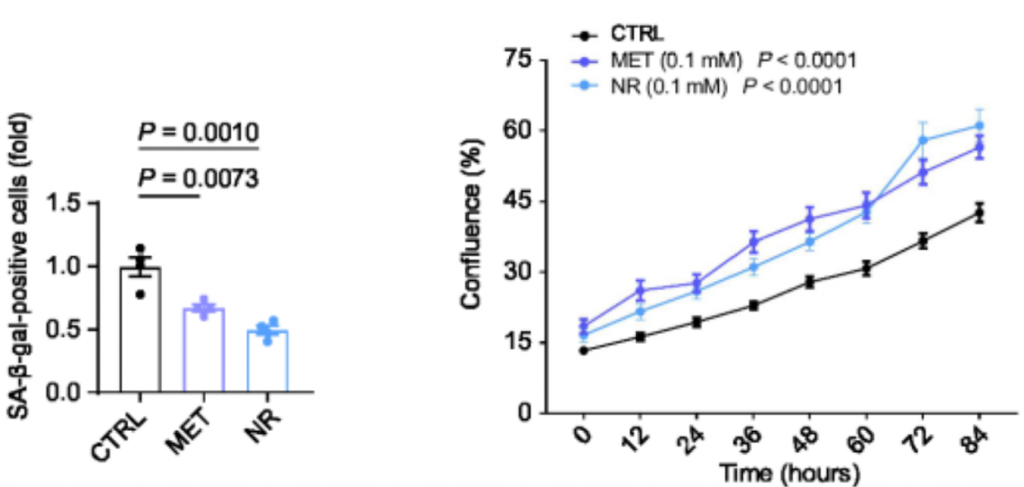Key Points:
- Metformin and NR rejuvenate prematurely aged stem cells, suggesting an increased capacity for tissue regeneration.
- Treatment with metformin and NR decreases inflammation and fibrosis — key aging features — in the organs of aged rats.
- Both metformin and NR decrease pro-inflammatory gene activation.
In the world of anti-aging research, two compounds have risen to the forefront. Metformin – a common diabetes medication – and nicotinamide riboside (NR) – an NAD+ precursor – have both been shown to confer numerous anti-aging benefits. A recent study looks at how metformin and NR compare.
The study, out of China, published in Life Medicine, looked at the effects of metformin and NR on both human cells and aged rats. Using a prematurely aged stem cell model, the scientists found that treatment with metformin and NR increased cellular self-renewal while decreasing cellular senescence – a state of non-proliferation. In aged rats, both metformin and NR decreased inflammation and fibrosis. Despite their similar physical effects, metformin and NR affected different genes, although both affected the regulation of inflammatory genes.
“Both metformin and NR attenuate senescence phenotypes in human stem cells…and in a variety of rodent tissues…, thus providing a valuable resource and foundation for further evaluation of these two compounds against aging,” the scientists wrote.
Metformin and NR Rejuvenate Prematurely Aged Human Stem Cells
Our stem cells are capable of becoming any cell type and can help regenerate damaged tissue. However, with age, some stem cells become senescent (dormant) and can no longer function as tissue regenerators. To determine the effect of metformin and NR on aged stem cells, Geng and colleagues used stem cells derived from individuals with Werner or Cockayne syndrome, genetic disorders that cause premature aging.
The Chinese scientists found that both metformin and NR enhanced stem cell propagation (self-renewal) and decreased senescent cell numbers. The treatments also decreased the inflammatory response, which is known to cause damage to tissues when chronically active. These findings suggest that metformin and NR can turn back the clock on aging by helping tissues regenerate from age-induced damage.

NR and Metformin Reduce Inflammation and Fibrosis in Multiple Organs
The scientists sought to investigate the whole-body effects of NR and metformin, so they treated 23-month-old rats (about 55 in human years) with either 100 mg/kg metformin or 500 mg/kg NR daily for 5 months. There was no increase in lifespan, but the thickening of the artery walls normally seen in aged rats was significantly reduced with metformin treatment. Additionally, fat storage under both treatments was similar to that seen in young rats, suggesting metabolic restoration. Furthermore, metformin significantly reduced inflammatory cell infiltration into the lungs, brain, liver, and kidneys, while NR significantly reduced inflammatory cell infiltration into the kidneys and muscles.
Both treatments reduced fibrosis – characteristic of aging – in the liver, fat tissue, and lungs, while metformin also reduced fibrosis in the heart and muscles. Fibrosis – which can be caused by inflammation – can lead to organ dysfunction and, ultimately, organ failure. Thus reducing fibrosis is a useful method for retaining organ function as we age.

Both metformin and NR also restored age-related changes in gene activation, with differences seen across different tissue types. The researchers found that metformin and NR tended to affect different signaling pathways, but they both decreased the inflammatory response and inactivated many pro-inflammatory gene activators. The researchers suggest that metformin and NR’s effects on inflammatory genes and proteins may be the main mechanism underlying their anti-aging effects.
Metformin and NR as Anti-aging Tools
Geng and colleagues found that metformin and NR alleviate age-related issues, including inflammation and fibrosis, across multiple tissue systems, while previous research has just looked at individual organs. The results suggest how deleterious inflammation can be to one’s healthspan.
Studies done in roundworms and mice have shown that metformin may have lifespan-extending effects, although those same effects weren’t seen in this study nor in another rat-based model, indicating that metformin may have species-specific effects, and more research is needed. Similar results were seen with NR, where it extended mouse lifespan but not rat lifespans.
The research is mounting that metformin and NR can have positive effects on healthspan, if not lifespan. A retrospective study comparing diabetics on metformin and non-diabetics found that those taking metformin lived longer, and many studies support NR as having beneficial anti-aging effects. More research is needed before these compounds can be fully utilized as a part of an anti-aging treatment plan.